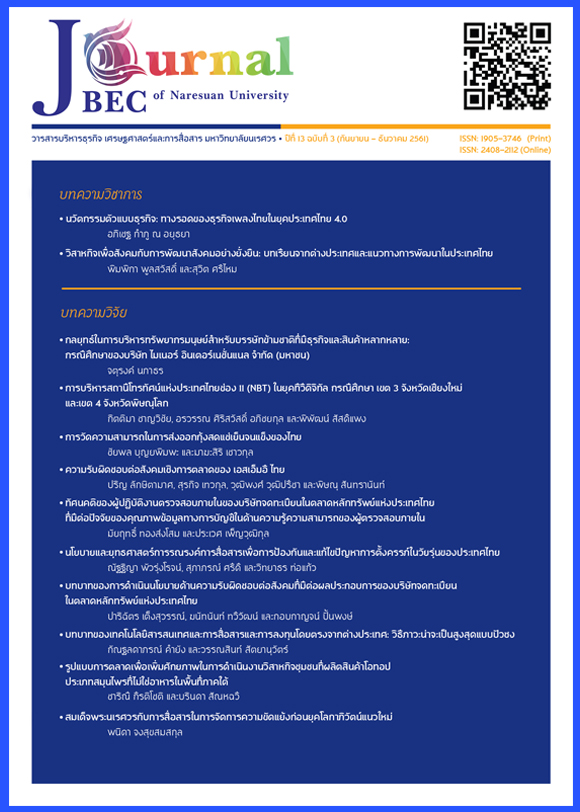บทบาทของการดำเนินนโยบายด้านความรับผิดชอบต่อสังคมที่มีต่อผลประกอบการ ของบริษัทจดทะเบียนในตลาดหลักทรัพย์แห่งประเทศไทย
Main Article Content
บทคัดย่อ
บทความวิจัยนี้ มีวัตถุประสงค์เพื่อศึกษาการดำเนินกิจกรรมด้านความรับผิดชอบต่อสังคม ประเมินและเปรียบเทียบผลการดำเนินงานขององค์กรธุรกิจที่มีความรับผิดชอบต่อสังคมกับองค์กรธุรกิจอื่น กลุ่มเป้าหมายในการวิเคราะห์คือบริษัทที่จดทะเบียนในตลาดหลักทรัพย์แห่งประเทศไทย ที่มีมูลค่าตามราคาตลาดสูงสุด 100 อันดับแรก ในปี พ.ศ. 2557 โดยใช้การวิเคราะห์โอบล้อมข้อมูล (Data Envelopment Analysis: DEA) ผลการวิจัยพบว่า เมื่อทำการแบ่งกลุ่มบริษัทที่จดทะเบียนในตลาดหลักทรัพย์แห่งประเทศไทยที่มีมูลค่าตามราคาตลาดสูงสุด 100 อันดับแรก (ตามดัชนี SET100) จากการดำเนินกิจกรรมด้านความรับผิดชอบต่อสังคม และการจัดทำรายงานการพัฒนาอย่างยั่งยืนในปี พ.ศ. 2557 สามารถแบ่งเป็นองค์กรธุรกิจที่มีความรับผิดชอบต่อสังคม จำนวน 43 บริษัท และองค์กรธุรกิจอื่น จำนวน 57 บริษัท และในส่วนของการประเมินประสิทธิภาพขององค์กรในส่วนของผลประกอบการด้านการทำกำไรและผลประกอบการด้านการตลาดขององค์กรธุรกิจที่มีความรับผิดชอบต่อสังคมเปรียบเทียบกับองค์กรธุรกิจอื่น พบว่าองค์กรธุรกิจที่มีความรับผิดชอบต่อสังคมมีผลการดำเนินงานด้านการทำกำไร และผลการดำเนินงานด้านการตลาดสูงกว่าเมื่อเทียบกับองค์กรธุรกิจอื่น
Article Details
References
2. Banker, R. D., Charnes, A. and Cooper, W. W. (1984). Some models for the estimation of technical and scale inefficiencies in data envelopment analysis. Management Science, 30(9), 1078-1092.
3. Charnes, A., Cooper, W. W. and Rhodes, E. (1978). Measuring the efficiency of decision making units. European Journal of Operational Research, 2(6), 429-444.
4. Cheewarunotai, W. (2010). The power of CSR to excellence organization advance edition. Bangkok, Thailand: Thanprinting.
5. Corporate Social Responsibility Institute. (2008). Business compass for social. Bangkok: Icon Printing.
6. Elhauge, E. (2005). Sacrificing corporate profits in the public interest. New York University Law Review, 80(3), 733-869.
7. Farrell, M. J. (1957). The measurement of productive efficiency. Journal of the Royal Statistical Society. Series A (General), 120(3), 253-290.
8. Friedman, M. (1970). The social responsibility of business is to increase its profits. New York Times Magazine, 122-124.
9. Kotler, P. and Lee, N. (2005). Corporate social responsibility. New Jersey: John Wiley & Sons.
10. Krongkaew, M. (2009). How do economists view for the corporate social responsibility?. In Moral Lead Business. Bangkok: Office of the National Anti-Corruption Commission.
11. Naphavaranonth, P. (2008). CSR: Business social and sustainability. BOI e-Journal, 19(6), 39-42.
12. Odthon, P. (2009). Technical efficiency measurement through Data Envelopment Analysis (DEA): A case study of asset management companies. Ramkhamhaeng University Journal, 26(Special), 337-350.
13. Patmasiriwat, D. (2009). Efficiency of the medium-sized community hospitals in Thailand: The case study of 166 community hospitals under the Ministry of Public Health. NIDA Development Journal, 49(1), 79-104.
14. Sakboonyamal, P. and Homsombat, W. (2016). The sustainability of listed companies moving from market for alternative investment to the stock exchange of Thailand. Journal of Business, Economics and Communications, 11(1), 56-68.
15. Lo, S. (2010). Performance evaluation for sustainable business: A profitability and marketability framework. Corporate Social Responsibility and Environment Management, 17(6), 311-319.
16. Suwankesorn, S. (2009). Efficiency evaluation of the general – hospitals under the Ministry of Public Health with Data Envelopment Analysis technique. Thaksin University Journal, 12(3), 234-244.
17. Thaipat Institute. (2010). Type of CSR activities. Retrieved November 9, 2010, from https://www.thaicsr.com/2008/01/blog-post_07.html
18. Untong, A. (2004). Manual for using DEAP 2.1 program for efficiency analysis by Data Envelopment Analysis method. Chiang Mai: Social Research Institute Chiang Mai University.
19. Yampracha, C. and Tor-Sriwong, B. (2009). Review of Corporate Social Responsibility (CSR) and case of CSR activity in pharmaceutical business. The Thai Bulletin of Pharmaceutical Sciences, 4(3), 97-120.

